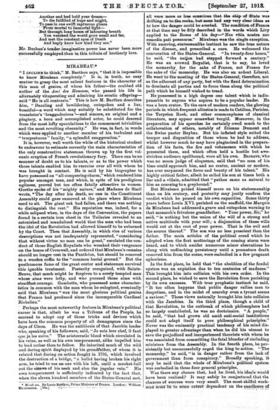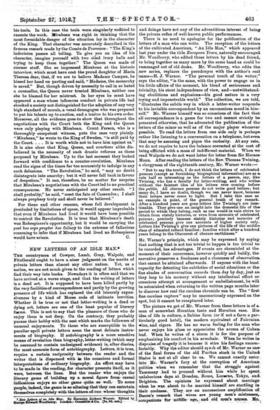MIRABEAT.T.*
"I INCLINE to think," M. Barthou says, "that it is impossible to know Mirabeau completely." It is, in truth, no easy matter to grasp the most salient features in the character of this man of genius, of whom his father—the crabbed old author of the Anti des Hontmes, who passed his life in alternately vituperating and admiring his erratic offspring— said "He is all contrasts." This is how M. Barthou describes Lim, "Dazzling and bewildering, outspoken and a liar, boastful—a word which may suitably be substituted for the translator's braggadocious '—and sincere, an original and a plagiary, a born and accomplished actor, he could descend from the most lofty speculations to the commonest trivialities and the most revolting obscenity." He was, in fact, in words which were applied to another member of his turbulent and "
tempestuous" family, "a splendid exaggeration."
It is, however, well worth the while of the historical student to endeavour to estimate correctly the main characteristics of the only constructive statesman thrown up by the first vol- canic eruption of French revolutionary fury. There can be no snanner of doubt as to his talents, or as to the power which those talents enabled him to exercise over all with whom he was brought in contact. He is said by his biographer to have possessed an "all-conquering charm," which rendered him popular amongst men, and which, in spite of his prodigious ugliness, proved but too often fatally attractive to women. Goethe spoke of his "mighty nature," and Madame de Stael wrote, "The day after his death, no one in the Constituent Assembly could gaze unmoved at the place where Mirabeau used to Bit. The giant oak had fallen, and there was nothing to distinguish the rest." His reputation was, indeed, for a while eclipsed when, in the days of the Convention, the papers found in a certain iron chest in the Tuileries revealed to an astonished and scandalized world that the man who had been the idol of the Revolution had allowed himself to be suborned by the Court. Then that Assembly, in which vice of various descriptions was not inadequately represented, "considering that without virtue no man can be great," emulated the con- duct of those English Royalists who wreaked their vengeance on the bones of Cromwell, and ordered that Alirabeau's remains should no longer rest in the Pantheon, but should be removed in a wooden coffin to the "common burial ground." But the posthumous fame of the great orator and statesman survived this ignoble treatment. Posterity recognized, with Sainte- Beuve, that much might be forgiven to a sorely tempted man whose aims were lofty, and who pursued those aims with steadfast courage. Gambetta, who possessed some character- istics in common with the man whom he eulogized, eventually said that Mirabeau "was the most glorious political genius that France had produced since the incomparable Cardinal Richelieu."
Perhaps the most noteworthy feature in Mirabeau's political career is that, albeit he was a Tribune of the People, he scorned to adopt any of those tricks and devices which have been the common property of all demagogues since the days of Cleon. He was the antithesis of that Jacobin leader who, speaking of his followers, said, "Je suis lenr chef, il faut que je lea suive." The aristocratic blood which circulated in his veins, as well as his own temperament, alike impelled bins to lead rather than to follow. He inherited much of the wild and daring spirit displayed by his grandfather, of whom it is related that during an action fought in 1705, which involved the destruction of a bridge, "a bullet having broken his right arm, he tried to use an axe with his left, until a musket-ball cut the sinews of his neck and also the jugular vein." His own temperament is sufficiently indicated by the fact that, when the eleven hundred members of the States-General met, • Mirab au. By Louie Bartbou,Prime Minister of France. London: William ReMemann. [10s.] all were more or less conscious that the ship of State was drifting on to the rocks, but none had any very clear ideas as to how the danger could be averted. The condition of France at that time may be fitly described in the words which Livy applied to the Rome of his day—"Nec vitia nostra nee remedia pati possumus." Mirabeau was the single exception. With unerring,-statesmanlike instinct he saw the true nature of the disease,_ and prescribed a cure. He welcomed the convocation of the States-General. "In twenty-four hours," he said, "the nation had stepped forward a century." He was an avowed Royalist, that is to say, he loved the monarchy for the sake of France, not France for the sake of the. monarchy. He was also an ardent Liberal. He went to the meeting of the States-General, therefore, not as the adherent of any party, but with the fixed determination to dominate all parties and to force them along the political path which he himself wished to tread.
He possessed in a high degree one talent which is indis- pensable to anyone who aspires to be a popular leader. He was a born orator. To the ears of modern readers, the glowing periods in which frequent allusion is made to Catiline, Pericles, the Tarpeian Rock, and other commonplaces of classical literature, may appear somewhat turgid. Moreover, in the preparation of his speeches he certainly owed much to the collaboration of others, notably of Etienne Dumont and the Swiss pastor Reybaz. But his inflated style suited the temper and disposition of those whom he had to address, whilst however much he may have plagiarized in the prepara- tion of his facts, the fire and vehemence with which he presented them, and which often held a hostile but awe- stricken audience spellbound, were all his own. Barnave, who was no mean, judge of eloquence, said that "no man of his time could approach him, and no orator, ancient or modern. has ever surpassed the force and beauty of his talent." His highly critical father, albeit he called his son at times both a liar and a villain, admitted that "pathos came as natural to him as coursing to a greyhound."
But Mirabeau prided himself more on his statesmanship than on his oratory, and posterity may justly confirm the verdict which he passed on his own capacities. Some thirty years before Louis XVI. perished on the scaffold, the Marquis de Mirabeau had addressed a grave and outspoken warning to that monarch's frivolous grandfather. "Your power, Sir," he said, "is nothing but the union of the will of a strong and active multitude with your will; a disjunction of these wills would cut at the root of your power. That is the evil and the source thereof." The son was no less prescient than the father. The main articles of the political creed which he adopted when the first mutterings of the coming storm were heard, and to which amidst numerous minor aberrations he clung with unflinching persistency until a premature death removed him from the scene, were embodied in a few pregnant aphorisms.
In the first place, he held that "the abolition of the feudal system was an expiation due to ten centuries of madness." This brought him into collision with his own order. In the second place, he wished to save the Revolution from perishing by its own excesses. With true prophetic instinct he said, "It too often happens that public danger rallies men to despotism, and in the midst of anarchy even a tyrant seems a saviour." These views naturally brought him into collision with the Jacobins. In the third place, though a child of that Revolution, to the outbreak of which philosophers had so largely contributed, he was no doctrinaire. "A people," he said, "that had grown old amid anti-social institutions could not adapt itself to pure philosophical principles."
Never was the eminently practical tendency of his mind dis- played to greater advantage than when he did his utmost to save the prejudiced and inexperienced theorists with whom be was associated from committing the fatal blunder of excluding ministers from the Assembly. In the fourth place, he per- sistently but unsuccessfully urged the king to action. "The monarchy," he said, "is in danger rather from the lack of government than from conspiracy." Broadly speaking, it may be said that the whole of Alirabean's political system was embodied in these four general principles.
Was there any chance that, had he lived, his ideals would have been realized? It may safely be conjectured that ths
chances of success were very small. The most skilful work- Man resist he to Ome -extent dependent on the excellence of his tools. In this case the tools were singularly unfitted to execute the work. Mirabeau was right in thinking that the most formidable danger of the situation lay in the character of the King. That character was accurately described in the famous remark made by the Comte de Provence: "The King's indecision passes all telling. To give you an idea of his character, imagine yourself with two oiled ivory balls and trying to keep them together." The Queen was made of sterner stuff. She no impressed Mirabeau at the historic interview, which must have cost the proud daughter of Maria Theresa dear, that, if we are to believe Madame Campan, he kissed her hand on parting and said, "Madame, the monarchy is saved." But, though driven by necessity to call in so hated a counsellor, the Queen never trusted Mirabeau, neither can she be blamed for her mistrust. In her eyes be must have appeared a man whose infamous conduct in private life had shocked a society not distinguished forthe adoption of any very high standard of morals, a venal demagogue who was prepared to put his talents up to auction, and a traitor .to his own order. Moreover, all the evidence goes to show that throughout the negotiations with the Court both the King and the Queen were only playing with Mirabeau. Count Fersen, who is a thoroughly competent witness, puts the case very plainly. "Mirabean," he wrote to the King of Sweden, "is still paid by the Court. . . . It is worth while not to have him against us." It is also clear that King, Queen, and courtiers alike dis- believed in the necessity of such drastic reforms as those proposed by Mirabeau. Up to the last moment they looked forward with confidence to a counter-revolution. Mirabeau read the signs of the times far too accurately to indulge in any such delusions. "The Revolution," he said, "may no doubt disintegrate into anarchy; but it will never fall back in favour of despotism." It can, therefore, be no matter for surprise that lifirabean's negotiations with the Court led to no practical consequences. He never anticipated any other result. "I shall probably," he said, "meet the fate of Cassandra; I shall always prophesy truly and shall never, be believed."
For these and other reasons, whose full development is Precluded by limitations of space, 4twould appear improbable that even if Mirabeau had lived it would have been -possible tar control the Revolution. It is true that Mirabeau's death was Robespierre's opportunity, but it would be carrying the post hoc ergo yropter hoc fallacy to the extreme of fallacious reasoning to infer that if Mirabeau had lived no Robespierre











































 Previous page
Previous page